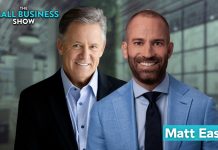Welcome to another episode of Atlanta Franchise Today with host Leslie Kuban, expert franchise consultant and owner of FranNet Atlanta. Atlanta Franchise Today is dedicated to bringing entrepreneurs and business owners the best practices and tips for their franchise goals. Today, Leslie is joined by Edwin Fromayan, franchise owner of Meineke Car Care Centers Marietta. Fromayan’s journey into franchise ownership started with his desire to diversify his investment strategy by investing in a business of his own—without abandoning or disrupting his corporate career. In this segment, we’ll learn more about Fromayan’s entrepreneurial background and the advantages of semi-passive franchise ownership.
Transcription:
Leslie Kuban:
Edwin, welcome to the program.
Edwin Fromayan:
Thanks for having me, Leslie. Great to be here.
Leslie Kuban:
Really appreciate you. You’re a busy guy, appreciate you coming in and spending some time.
Edwin Fromayan:
Absolutely. Yeah, it’s quite a journey and very proud about it. It’s an interesting experience and happy to have a discussion about it.
Leslie Kuban:
Excellent. Well, let’s talk a little bit about your business first. Tell us about Meineke and what your business is and who your customers are?
Edwin Fromayan:
Yeah. So for me personally, again, from a professional standpoint, I’ve been in technology for over 25 years. I worked specifically right now in the FinTech segment. I absolutely enjoyed it, it’s extremely challenging. Getting to solve problems at a global scale for a very large company. I took a look around and said, “I’m investing all your traditional equities, bonds, et cetera. And those are great instruments.”
Edwin Fromayan:
So at the flip side, it was, “Well, you’re investing in companies you’re believing in their strategy and their execution ability to deliver value for you. What if you could do something on your own?” Again, not necessarily to replace income, but from a commercial perspective, give you levels of return that if you were to take that same money, put it in the market over a period of time, it creates either from a dividend perspective, cash flow. And then from a value perspective, from day one to whenever you look to cash that in, it created value from that perspective. So that was kind of spurred the thinking in terms of, “Hey, what are opportunities out there?” And that’s where you and I started to have the conversation about franchise ownership and I started to explore.
Leslie Kuban:
And do you recall back at the onset of your thought process about that? What had you think about franchising? Had you ever thought about franchising before or been exposed to it as an asset class?
Edwin Fromayan:
Yeah, not specifically thinking about franchising, but it was more around business ownership. So the romantic idea in terms of owning a business has always been something that been within my mindset. But then the question came, you do have a corporate career, a full-time job. What is it can you do that still allows you to fulfill that particular path? But at the same time, give you an opportunity to explore creating your own equity and wealth from that standpoint.
Edwin Fromayan:
So to create to me a start from scratch business and still maintain corporate would be extremely challenging. So the next part is not that it’s impossible, but it would be extremely challenging. So the next part is, what are other options out there? So you could buy an existing business. True. And then the other part was, after that, what’s next? So franchising. And I think I didn’t necessarily pick a segment at the time, it was just more, what is franchising? And that’s when I reached out to start to investigate and explore, how do you think about it? How do you select one? Is this based on passion? Is it based on market trends? And that’s where the journey started.
Leslie Kuban:
So it wasn’t for you, “I want to own a Meineke Car Care Center franchise.” It led to that.
Edwin Fromayan:
Correct.
Leslie Kuban:
But do you recall back Edwin, what were your criteria? You know you wanted something that would allow you to continue the corporate career you enjoy. So that model needed to be there for that. But what else? What else did you know you were looking for?
Edwin Fromayan:
Exactly. So being an IT person, everything is structured. So, there’s got to be a plan and that’s got to be goals, objectives, et cetera. So number one, I needed something from a viability standpoint, almost had a roadmap, so to speak, meaning a proven methodology. And then number two, it was something in terms from a support perspective. Because again, I’m not looking to do this as a replacement to my current career, I’m doing it as an investment. So there has to be that sustainability or the ability to reach out to others to kind of help you if you encounter something, help you overcome that.
Edwin Fromayan:
So with those types of criteria, then it became franchise. I wanted to be locked in from a 7:30, till five o’clock, once you shut the doors operations end, it picks up the next day. So it started to narrow things down. And to me, being a technologist, technology was going to be a huge influence and factor in that final decision. Because number one, efficiency, the ability to make sure the business is keeping on track. We’re meeting our financial objectives, we’re taking care of our customers and we’re being a viable organization.
Leslie Kuban:
So you needed something that clearly the infrastructure, the technology was there to monitor and serve in the function of the owner remotely. And so the technology needed to already be developed. Walk us through the timeline, Edwin, from the timeline that you first started talking with Meineke, your due diligence, you signed the papers, you paid your money and then opened for business. What was that timeline for you?
Edwin Fromayan:
I would say, believe it or not, Leslie, when we started the conversation, it’s been over two and a half years. So it takes some time.
Leslie Kuban:
So you have seven employees?
Edwin Fromayan:
Yeah.
Leslie Kuban:
I heard you mention.
Edwin Fromayan:
Yeah, total.
Leslie Kuban:
What does that look like? Is there a general manager, assistant?
Edwin Fromayan:
Yeah, absolutely.
Leslie Kuban:
You’ve got your technicians.
Edwin Fromayan:
Yeah. So you have your general manager, basically, he’s in charge of the full operations. And then you have, what’s called your service advisor. So that’s the person that’s individually interacting with customers, answering phone calls, making sure that whatever the commitment is to your customer, you’re working with the tech. So they understand have to prioritize their work requirements. And then you have your service manager and your technicians. So the service manager and the lead tech, it’s a dual role. So he’s our best person that can diagnose problems. And again, I looked at the structure of the workplace because to me, everything has to be cohesive and it has to make sense.
Edwin Fromayan:
So back to the technology with Meineke, the entire process is 100% digital. So they have a particular tool that the mechanic uses, so if he’s off pace, the tool would alert him. And it goes to the service advisor, “Okay, running behind schedule because the parts is being delayed because of whatever reason.” Immediately the service advisor doesn’t have to pick up a phone, can just hit the button. It will send a message directly to text, email, or a voice call if that’s what the customer preferred. So again, using all of that ability to text and it takes them a couple of seconds, you’re off to the next item. So that’s why I really, really appreciate the Meineke total journey in terms of how to transform the way automotive care is delivered today.
Leslie Kuban:
It’s not just turning wrenches-
Edwin Fromayan:
No.
Leslie Kuban:
Is it?
Edwin Fromayan:
No, it’s not.
Leslie Kuban:
I think this is so fascinating. And I think this is, for our viewers, it’s just such a good example of how the magic of a strong franchise system is what’s under the hood, no pun intended. But the systems, the technology, the thoughtfulness, the investment that it takes to create and enhance and continue and to improve those systems and technologies for a big and growing system-
Edwin Fromayan:
Oh, it is.
Leslie Kuban:
Like Meineke is.
Edwin Fromayan:
Exactly. And again, the customer experience in the automotive sector, I mean, there’s tremendous room for improvement. So to me, that’s our opportunity. And that’s what allows me to differentiate the way we deliver car care service versus our competitors. And we’re seeing that in the online reviews and the customer feedback. Using technology to be able to interact with customer, I think is really starting to change that experience as we interact. Car care is expensive, so having appreciation and make sure you’re delivering value to your customers. So, that’s what I stress to my staff.
Leslie Kuban:
Well, speaking of challenges-
Edwin Fromayan:
Yes.
Leslie Kuban:
Even with all the precision and all the efficiencies that clearly this business has, you have been able to run your business and learn a new business. Not every day is perfect.
Edwin Fromayan:
No.
Leslie Kuban:
Just, if you think back to when you were just getting going with this, just as a new business owner-
Edwin Fromayan:
Correct.
Leslie Kuban:
What were some of the challenges that cropped up that maybe you didn’t think about, but then you overcame them?
Edwin Fromayan:
Yeah, exactly.
Leslie Kuban:
What comes to mind?
Edwin Fromayan:
Yeah. Again, you’re looking at the industry, a lot of your technicians have been in the industry 10, 15 years. And they empirically know, physically, what to do. And how are they going to embrace this level of change? They’re not used to necessarily using technology as part of the normal day to day life. So it takes a tremendous amount of coaching to help them see the value in terms of doing it a different way. It’s not that you can’t diagnose that, it’s just that there’s a different way that’s more effective in terms of what you see as a mechanic. How do you relay that information upstream to the service advisor?
Edwin Fromayan:
So you have to help them … what’s the value proposition? I think trying to convince them. And they’re very, very skeptical because again, if you don’t do this right, it could be a really bad experience for the employees and for the facility. So you have to make sure you win them over. So to me, challenge wise, I appreciated that from their perspective in terms of look … for example, in my market space, I’m the only center doing what I’m doing. So they have no point of reference. So you have to appreciate that and if they’re questioning you, it’s okay, don’t take it personally. Just help them overcome that. So to me, that’s been the biggest learning experience.
Leslie Kuban:
Training hurdle.
Edwin Fromayan:
Yes. Correct.
Leslie Kuban:
So Edwin, there’s a lot of people like you-
Edwin Fromayan:
Sure.
Leslie Kuban:
Demanding corporate roles and they dream of owning a business-
Edwin Fromayan:
Correct.
Leslie Kuban:
But it doesn’t just happen, you don’t snap your fingers-
Edwin Fromayan:
Exactly.
Leslie Kuban:
And there’s some things you have to be prepared for and to be honest with yourself-
Edwin Fromayan:
Correct.
Leslie Kuban:
About maybe-
Edwin Fromayan:
Sure.
Leslie Kuban:
For our viewers who have interest in doing similarly as you have done, what advice do you have for them about … what do they need to ask themselves to determine if they’re really ready to get into their own business?
Edwin Fromayan:
Yeah, the first thing I would say to be honest with yourself, is what do you want to get out of the business? And how are you going to create value? Again, if you’re going into it to become an income replacement or something that’s going to boost you X amount of wherever you are today currently from your pay perspective. Understand what that commitment requires. So, if you want to do it for that particular reason, then that’s okay.
Edwin Fromayan:
Now, if you’re trying to do it as an investment, but you’re not ready to commit upfront in terms of defining what is it you’re going to put into it? How are you going to make sure that becomes successful? Because everything has risk. You have to be able to multitask tremendously, put in a lot of hours. For me, again, my corporate work is seven by 24 and that’s number one and this cannot conflict with that. So everything I do is to make sure you take care of your corporate first and then secondarily, whatever’s left, that’s what has to go to making sure you’re being responsive to your employees, you’re being responsive to your business partner, again, which are the franchisee. Or in some cases, your vendors or suppliers. But really yeah, do your homework would be the key thing.
Leslie Kuban:
Which is a part-time job-
Edwin Fromayan:
Which is … absolutely.
Leslie Kuban:
In and of itself.
Edwin Fromayan:
Yeah. I mean, remember, you would send me different videos of different strategies. Not necessarily about the automotive industry, but just about running a business. Those are extremely helpful. Again, from a contextual, I look at the message. Not necessarily is it about the automotive industry? Is it about food service? It really doesn’t matter. It’s really at the strategy level. That’s where you have to extrapolate that from. And it’s extremely helpful. People are willing to share it and hopefully I can do the same, as well.
Leslie Kuban:
Yes. Yes. You’ll be on the other side of that, getting calls from people to pick your brains-
Edwin Fromayan:
Absolutely.
Leslie Kuban:
About that.
Edwin Fromayan:
It’s part of the life cycle, so I’m okay with that.
Leslie Kuban:
And I love what you said about the field of dreams.
Edwin Fromayan:
Correct.
Leslie Kuban:
Owning your own business, even with a well-branded franchise-
Edwin Fromayan:
Correct.
Leslie Kuban:
Like Meineke, this is not field of dreams.
Edwin Fromayan:
No.
Leslie Kuban:
You build it and the people come. And I think you’ve got to market, you’ve got to recruit your staff. Like it doesn’t just happen, you’ve got to be an active participant in it.
Edwin Fromayan:
You have to be an active participant. And that’s what I’m saying, you’ve got to be honest with yourself in terms of, why are you getting into it? So before you make that commitment, look at it from a, what’s the worst case scenario in terms of how badly things could go, that will still not frighten you from that? And if you’re comfortable with it to me, then definitely is something for you.
Edwin Fromayan:
But if you’re apprehensive, to me, this is not something you can halfway do. So you either you’re committed to it or you’re not. Again, it’s not for everybody and I fully get that. That’s why you have, again, you’re traditional instruments in terms of investing. There’s nothing wrong with that. Again, I still have this as part of my portfolio, but at the same time everything has it’s pluses and minuses. So if you’re in the market today, you have other factors that are impacting you, so you have to kind of live with that. So that’s why when I look at it, it’s like, well, what’s the difference?
Edwin Fromayan:
I didn’t do anything necessarily to influence what’s happening geopolitically, but guess what? That’s the world we live in. So if it does, depending on where you are in terms of your financial life cycle, meaning close to retirement, or you wanted to do something and you’re dependent on your investment being at a particular level. Then those factors are way beyond your control. Versus for me … and again, it’s just, I don’t know … my timing, there was nothing scientific about when I did what I did. But just the opportunity was there and I took it. So looking at that same investment strategy, if I model it against, okay, if I just purely done something on the open market, completely different. Because what I’ve invested in, what the business value is, what the income stream is. Is almost four X what it would’ve been in the market. Now I’ve put in a lot of time. Like I said, it’s a two to three year journey, a lot of research. So yeah, you’re getting the return now, but because you put in the sweat equity, so to speak.
Leslie Kuban:
And I think the way you’re sharing your thought process about this is really helpful for our viewers. I’m so glad that you’re coming in-
Edwin Fromayan:
Correct.
Leslie Kuban:
And sharing how you look at it, how you think about it, how you compare it to your other opportunities and look at it in the context of your overall future wealth building for you and your family.
Edwin Fromayan:
Absolutely. And that’s the way to look at it. And again, things happen at a macro level and I like to break it down to a micro level and say, “Okay, business to me is business. Whether you’re a Fortune 50 company or you’re a small business like this operation is. The principles apply the same, it doesn’t matter.” You have to have a strategy, you have to have a plan, you have to execute, you have to make sure people know what’s going on. You have to understand what your customer needs are and how you’re going to fulfill that on an ongoing basis. And yeah, whether I’m having a conversation with a CEO, CIO is the same level of engagement as I do with the team at the facility, the vendors, dealing with them and the customers in the end. It’s the same thing. Just one at a particular level from a corporate side versus a small business.
Leslie Kuban:
Yeah, we’re all people.
Edwin Fromayan:
It boils down to just people. Exactly.
Leslie Kuban:
Well, it’s been a treat to have you in to-
Edwin Fromayan:
Pleasure being here, Leslie.
Leslie Kuban:
Share about your story. This has been a great, great conversation. Really look forward to our viewers enjoying it-
Edwin Fromayan:
Absolutely.
Leslie Kuban:
As well.
Edwin Fromayan:
And hopefully it was helpful, but great to share the experience.
Leslie Kuban:
Thanks for coming.
Edwin Fromayan:
No, thanks for having me.
Leslie Kuban:
Folks, thanks for joining me again on another episode of Atlanta Franchise Today. I’m Leslie Kuban and I look forward to seeing you again next week.
The Atlanta Small Business Network, from start-up to success, we are your go-to resource for small business news, expert advice, information, and event coverage.
While you’re here, don’t forget to subscribe to our email newsletter for all the latest business news know-how from Atlanta Small Business Network.







